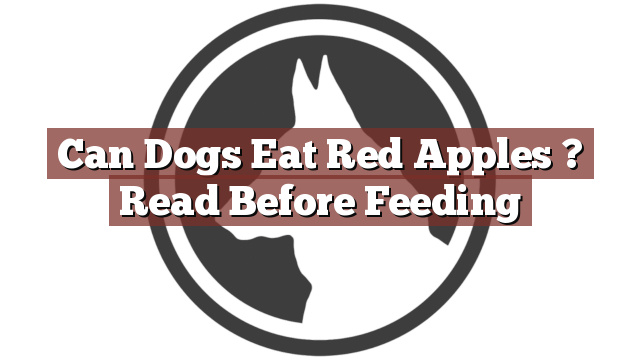Understanding Your Dog’s Dietary Needs
As a responsible pet owner, it is crucial to understand your dog’s dietary needs in order to provide them with a well-balanced and healthy diet. Dogs have specific nutritional requirements that differ from humans, and it is important to feed them a diet that meets these needs. While dogs primarily thrive on a diet rich in protein, they can also benefit from certain fruits and vegetables in moderation. However, not all human foods are safe for dogs to consume, and it is essential to be aware of potential risks before introducing new foods into their diet.
Can Dogs Eat Red Apples? Read Before Feeding
Can dogs eat red apples? This is a common question among dog owners who want to share their healthy snack with their furry friend. The answer is yes, dogs can eat red apples in moderation. Apples are an excellent source of vitamins A and C, as well as dietary fiber, which can support your dog’s overall health. The crunchy texture of apples can also help in promoting good dental hygiene by reducing plaque and freshening breath. However, it is important to note that while red apples are generally safe for dogs, there are some precautions to consider.
Pros and Cons of Feeding Red Apples to Dogs
Feeding red apples to your dog has its advantages and disadvantages. On the positive side, apples are low in calories and fat, making them a healthy choice for dogs who may need to lose weight or maintain a healthy weight. The natural sugars in apples can provide a sweet treat without the risk of added sugars found in many commercial dog treats. Apples also contain antioxidants that can help boost your dog’s immune system and protect against certain diseases.
However, it is crucial to feed red apples to your dog in moderation. Too many apples can lead to digestive issues, such as diarrhea or upset stomach, due to their high fiber content. Additionally, be cautious of the seeds and core of the apple, as they can be a choking hazard and may contain small amounts of cyanide. It is recommended to remove the seeds and core and slice the apple into small, dog-friendly pieces before feeding it to your furry companion.
Conclusion: Considerations for Feeding Red Apples to Your Dog
In conclusion, red apples can be a healthy and nutritious snack for your dog when given in moderation and with certain considerations. They provide vitamins, fiber, and antioxidants that can benefit your dog’s overall well-being. However, always remember to remove the seeds and core, and slice the apple into small, safe pieces. If your dog has any underlying health issues or allergies, it is best to consult with your veterinarian before introducing red apples or any new food into their diet. By understanding your dog’s dietary needs and making informed choices, you can ensure that they receive a balanced and enjoyable diet.
Thank you for taking the time to read through our exploration of [page_title]. As every dog lover knows, our furry friends have unique dietary needs and responses, often varying from one canine to another. This is why it's paramount to approach any changes in their diet with caution and knowledge.
Before introducing any new treats or making alterations to your dog's diet based on our insights, it's crucial to consult with a veterinarian about [page_title]. Their expertise ensures that the choices you make are well-suited to your particular pet's health and well-being.
Even seemingly harmless foods can sometimes lead to allergic reactions or digestive issues, which is why monitoring your dog after introducing any new food item is essential.
The content provided here on [page_title] is crafted with care, thorough research, and a genuine love for dogs. Nevertheless, it serves as a general guideline and should not be considered a substitute for professional veterinary advice.
Always prioritize the expert insights of your veterinarian, and remember that the health and happiness of your furry companion come first.
May your journey with your pet continue to be filled with joy, love, and safe culinary adventures. Happy reading, and even happier snacking for your canine friend!

